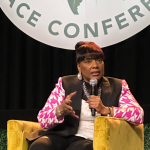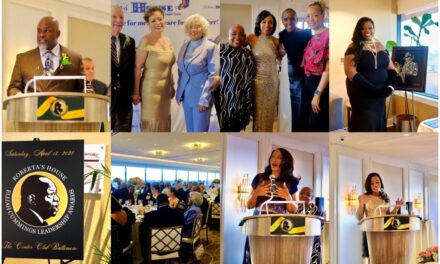By Ryan Michaels
The Birmingham Times
Dr. Bernice A. King, daughter of Civil Rights icon Dr. Martin Luther King Jr., and head of the foundation in his honor, delivered the keynote address on Saturday during the closing day of the 2023 International Peace Conference in Birmingham.
King’s visit came 60 years after her father helped lead mass demonstrations in Birmingham that brought attention to racial discrimination in the Jim Crow South and led to passage of the landmark Civil Rights Act of 1964.
The world today is more violent than during her father’s non-violent campaign, King said, pointing to the “proliferation of guns” and other societal ills such as injustice.
“People don’t think these things are violent, but they are because if you go back to the definition of peace — absence of tension, presence of justice. If we’re fighting for peace, you want justice for our people. You want fairness and you want people to have an opportunity to fulfill their best in life, and to be included, and we’re not doing well in that regard,” King said.
During Saturday’s discussion, King responded to questions from five students from Birmingham high schools, including G.W. Carver; P.D. Jackson-Olin; Ramsay International Baccalaureate High School and Woodlawn.
King said it’s important how discussions about societal problems are conducted. “I try to elevate the conversation, because in non-violence, as taught by Dr. [Martin] King, you don’t attack people who attack injustice … there’s a way to speak truth to power concerning what that person is doing and still leave them with their dignity…” she said.
“Even though you feel like they’re not acting dignified … Our role is to get to the bottom of the issue,” she added.
King, who urged people to visit the Equal Justice Initiative’s Legacy Museum in Montgomery, said two major issues facing Black people in America, and across the globe, are white supremacy and economic inequality.
“The reality is we’re [Black people] close to becoming endangered as a people because when you look across the board in every area, we’re still last, and it’s not because something’s wrong with us. It’s because of these systems…and we have to be very diligent and intentional and purposeful about addressing it” and fight it without “hostility,” King said.
“There’s a lot of anger in our community because of years of oppression, exploitation, right-out killing, torture and terrorism, but there has to be a critical mass of us who ascribe to a higher way. For me, it’s my father’s non-violence,” King said.
Committing to non-violence is a daily exercise which requires practice, King said.
“I’m human, I have emotions. … I want to not practice non-violence, but I have to breathe in and breathe out and land in a place [of non-violence] because I’ve committed myself to following the way of non-violence, point blank,” King said.
Today, much arguing and infighting happens through avenues like social media which sometimes can exacerbate problems, she said.
“All this bickering that happens outside and on social media has to stop … That’s something that needs to take place in circles of quietness because that spirit of oneness is powerful. It works every time…” King said.
The two-day 2023 International Peace Conference (IPC) kicked off at the Birmingham-Jefferson Convention Complex on Friday and drew hundreds from around the globe to discuss ways to create peace across numerous sectors of life and society, including education, environmental security and public safety.
Speakers included Birmingham Mayor Randall Woodfin; founding Birmingham Civil Rights Institute President Odessa Woolfolk; and University of Alabama at Birmingham (UAB) President Ray Watts, International Rotary President Jennifer Jones from Ontario, Canada among other leaders.











